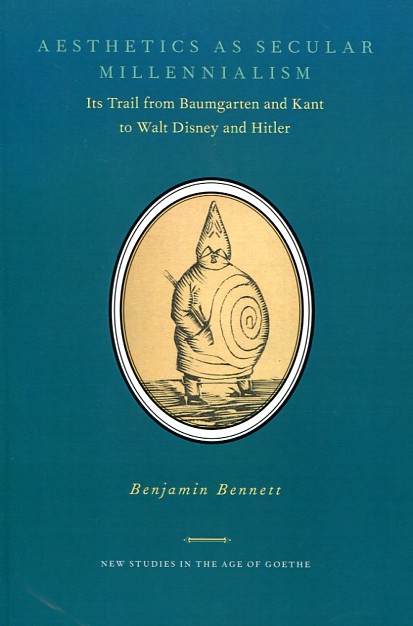Aesthetics as secular millennialism
its trail from Baumgarten and Kant to Walt Disney and Hitler
- ISBN: 9781611486582
- Editorial: Bucknell University Press
- Fecha de la edición: 2015
- Lugar de la edición: Lewisburg (PA). Estados Unidos de Norteamérica
- Colección: New Studies in the Age of Goethe
- Encuadernación: Rústica
- Medidas: 24 cm
- Nº Pág.: 300
- Idiomas: Inglés

The concept of secular millennialism summarizes a crucial point made by Hannah Arendt in The Origins of Totalitarianism: that twentieth-century totalitarian movements, in Nazi Germany and in the Soviet Union under Stalin, are not nationalistic but essentially millennialist, focused on the achievement of a universal world order. The question of whether totalitarian thinking can be located in a secular millennialist tradition is brought to the forefront in Aesthetics as Secular Millennialism: Its Trail from Baumgarten and Kant to Walt Disney and Hitler by Benjamin Bennett. Bennett contends that the new philosophical science of aesthetics-beginning in the eighteenth century with Baumgarten, Kant, and Schiller-is the source of such a tradition. Bennett uses the term "aesthetics" to designate a tradition which begins under that name but, in the course of the nineteenth century, concerns itself less directly with questions of beauty or art while not losing its secular millennialist tendency. He argues that modern philosophical hermeneutics, in Dilthey, Heidegger, and Gadamer, belongs to the aesthetic tradition. Bennett explores the realistic novel as the main vehicle by which aesthetic tradition maintains itself in the nineteenth century and attracts a large popular following. The argument culminates in a discussion of relations among aesthetics, totalitarian propaganda, and the "totalitarian imagination" with its dream of "human omnipotence" (Arendt). Aesthetics as Secular Millennialism also maintains an attentiveness to instances of resistance against the aesthetic impetus in history-hence ultimately against totalitarianism.






